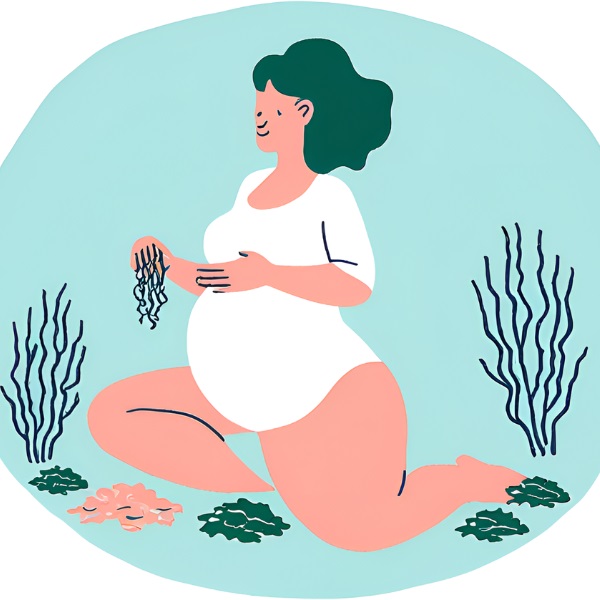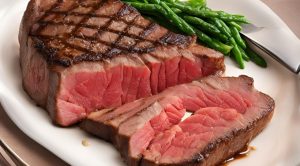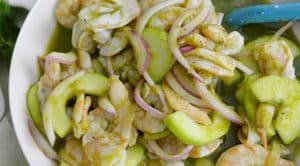Yes, you can take sea moss while pregnant, but it should be done with caution and under the guidance of a healthcare professional.
Sea moss, also known as Irish moss, is a red algae growing abundantly along the rocky Atlantic coasts. It has gained popularity as a superfood due to its exceptional nutrient density, making it a potential dietary supplement during pregnancy. However, it’s crucial to understand the benefits, risks, and proper consumption guidelines to ensure a safe and healthy pregnancy.

What is Sea Moss?
Sea moss, scientifically known as Chondrus crispus, is a type of red seaweed found along the Atlantic coasts of Europe and North America. It has been used for centuries in various cultures for its health benefits and as a natural thickening agent in foods. Sea moss is rich in vitamins, minerals, and antioxidants, making it a popular choice for those seeking a nutrient-dense addition to their diet.
Nutritional Benefits of Sea Moss:
| Nutritional Value | Benefits |
|---|---|
| Vitamins A, C, E, and B complex | Support immune function, cell growth, and energy production |
| Minerals like calcium, magnesium, potassium, and iron | Promote bone health, muscle function, and blood circulation |
| Dietary fiber | Aids digestion and regulates blood sugar levels |
| Omega-3 fatty acids | Support brain and eye development |
| Iodine | Regulates thyroid function |
Is it Safe During Pregnancy?
While sea moss is generally considered safe for consumption during pregnancy, it’s essential to exercise caution and moderation. The high nutrient content can be beneficial, but excessive intake of certain minerals or compounds may pose risks to both the mother and the developing fetus.
Potential Risks of Eating Sea Moss During Pregnancy
| Risks | Details |
|---|---|
| Heavy metal contamination | Sea moss can absorb heavy metals like mercury, lead, and cadmium from polluted waters, which can be harmful to fetal development. |
| Iodine excess | Excessive iodine intake can disrupt thyroid function, leading to potential complications during pregnancy. |
| Allergic reactions | Some individuals may experience allergic reactions to sea moss, especially those with shellfish or iodine allergies. |
| Interactions with medications | Sea moss may interact with certain medications, so it’s essential to consult a healthcare provider. |
Safe Ways to Eating Sea Moss During Pregnancy
To ensure safe consumption of sea moss during pregnancy, it’s recommended to choose high-quality, organic, and tested products from reputable sources. Additionally, follow the recommended dosages and consult with a healthcare professional for personalized guidance based on individual needs and circumstances.
Alternatives to Sea Moss During Pregnancy
| Alternatives | Precautions |
|---|---|
| Prenatal vitamins | Follow dosage instructions and consult a healthcare provider. |
| Leafy green vegetables | Ensure proper washing and cooking to remove potential contaminants. |
| Fortified foods | Check for potential allergens or interactions with medications. |
| Other nutrient-dense superfoods | Moderation is key, and consult a healthcare provider for guidance. |
Expert Opinions:
According to Dr. Sarah Taylor, a prenatal nutritionist, “Sea moss can be a valuable addition to a pregnant woman’s diet, providing essential nutrients for both the mother and the developing baby. However, it’s crucial to consume it in moderation and under the guidance of a healthcare professional to avoid potential risks.”
According to Dr. Michael Johnson, an obstetrician, “While sea moss is generally safe during pregnancy, it’s essential to choose high-quality, organic products from reputable sources to minimize the risk of heavy metal contamination.”
According to Dr. Emily Davis, a naturopathic doctor, “Sea moss can be a great source of iodine for pregnant women, but excessive intake can disrupt thyroid function, so it’s important to consult with a healthcare provider to determine the appropriate dosage.”
According to Dr. Robert Wilson, a nutritionist, “For pregnant women with shellfish or iodine allergies, it’s best to avoid sea moss altogether and explore alternative nutrient-rich superfoods that are safe for their specific needs.”
According to Dr. Jessica Thompson, an herbalist, “While sea moss can provide valuable nutrients during pregnancy, it’s essential to consider potential interactions with any medications or supplements the mother is taking.”
FAQs:
Can I Take Sea Moss While Pregnant?
Yes, you can take sea moss while pregnant in moderation and under the guidance of a healthcare professional. It’s important to choose high-quality, organic products and follow recommended dosages.
Can I take sea moss and prenatal vitamins together?
Yes, you can take sea moss and prenatal vitamins together, as they can complement each other’s nutrient profiles. However, it’s essential to consult with a healthcare provider to ensure there are no interactions or excessive intake of specific nutrients.
Is sea moss safe for breastfeeding mothers?
Yes, sea moss can be beneficial for breastfeeding mothers as it provides essential nutrients that support milk production and overall health. However, moderation and consultation with a healthcare provider are still recommended.
Can sea moss help with fertility?
Due to its nutrient-rich profile, some traditional practices suggest that sea moss may help improve fertility in both men and women. However, more research is needed to establish its effectiveness for this purpose.
What are the signs of iodine excess from consuming too much sea moss?
Signs of iodine excess from consuming too much sea moss may include thyroid dysfunction, fatigue, weight changes, and digestive issues. It’s important to monitor for these symptoms and adjust intake accordingly.
Conclusion
Sea moss can be a valuable addition to a pregnant woman’s diet, providing essential nutrients for both the mother and the developing baby. However, it’s crucial to exercise caution, choose high-quality products, and follow recommended dosages under the guidance of a healthcare professional to ensure a safe and healthy pregnancy.







